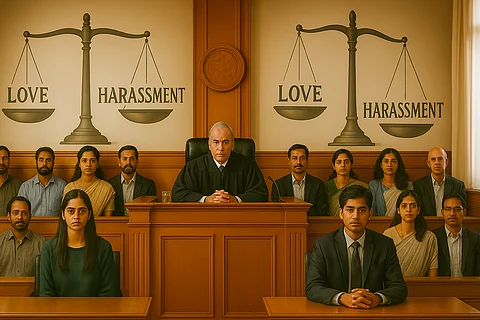
- Union Budget 2026
- Home
- NewsGram USA
- India
- न्यूजग्राम
- World
- Politics
- Entertainment
- Culture
- Lifestyle
- Economy
- Sports
- Sp. Coverage
- Misc.
- NewsGram Exclusive
- Jobs / Internships

Key Points:
Chhattisgarh High Court ruled that saying “I love you” isn’t harassment or assault.
A teen boy was booked under POCSO, IPC, and SC/ST Acts for saying “I love you” to a girl.
The court found no evidence of sexual or caste-based misconduct
In a country where even public displays of affection can invite judgmental stares—or worse, police intervention—it may come as a surprise that saying “I love you” isn’t actually illegal. Yes, you read that right. In a significant ruling that underscores the importance of free speech and judicial nuance in matters of consent, the Chhattisgarh High Court, on July 24, upheld a lower court's verdict and declared that merely expressing love by saying 'I love you' does not amount to sexual harassment or assault under Indian law.
The court ruled that such an expression, without any accompanying sexual intent or inappropriate physical behaviour, falls under the constitutional right to freedom of speech, guaranteed by Article 19(1)(a) of the Indian Constitution.
The case cantered on an incident from October 14, 2019, when a teenage boy allegedly told a 15-year-old girl “I love you” as she walked home from school with two friends in Kurud, a town in Dhamtari district, around 80 km from Raipur.
The girl and her parents viewed the incident as harassment and filed a police complaint. The boy was subsequently charged under several strict provisions, including Section 354-D of the Indian Penal Code (IPC) – Stalking, Section 509 of IPC – Insulting the modesty of a woman, Section 8 of the Protection of Children from Sexual Offences (POCSO) Act – Sexual assault and Relevant provisions of the SC/ST (Prevention of Atrocities) Act
The lower court had earlier acquitted the accused, citing lack of sufficient evidence, after which the matter was taken up by the Chhattisgarh High Court.
The Bench of Justice Sanjay S. Agrawal upheld the lower court's decision and clarified that merely saying “I love you” does not constitute sexual harassment under Section 7 of the POCSO Act, unless it is accompanied by sexual intent.
The court ruled the act of expressing love—without touching, threatening, stalking persistently, or acting with sexual intent—cannot be criminalized. It is protected under Article 19(1)(a), the fundamental right to freedom of speech and expression.
Justice Agrawal highlighted several critical flaws in the prosecution’s case. No birth certificate or school record was submitted. The alleged act of “stalking” or “insult to modesty” was not backed by convincing and reliable witness testimony. The girl’s two friends, who were with her at the time, did not provide evidence that corroborated claims of repeated harassment. There was no evidence that the accused made any reference to the girl’s caste, a necessary requirement to invoke the SC/ST Atrocities Act.
As a result, the court dismissed all charges, including those under POCSO, IPC, and SC/ST laws, and acquitted the accused.
The ruling has reignited debate around moral policing, conservative social values, and youth expression in India. In a society where public expressions of affection—especially towards girls—are often judged harshly, such cases sometimes snowball into legal complications even when no criminal intent is involved.
The court’s verdict, however, does not encourage inappropriate or coercive behavior. It draws a crucial line between expressing love and harassment, making intent and context the deciding factors.
As India navigates the evolving boundaries between personal liberty and social propriety, the Chhattisgarh High Court’s ruling is a reminder that not all expressions of emotion are crimes. The law must be applied with judgement, balancing the right to express with the right to safety and dignity. [Rh/VP]
